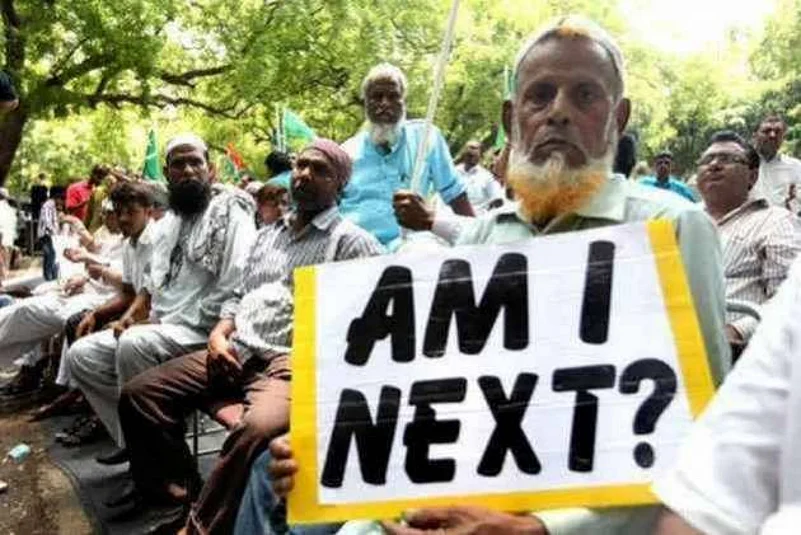I am not active on Twitter. When I heard #boycottmuslims was trending on Twitter India, I browsed through some of the filthy stuff out there. Feeling nauseous and disgusted, I soon signed out.
I do not have the luxury of ignoring the campaigners, unlike many of my liberal friends, because I happen to be one of those hapless citizens the demand for whose boycott is trending on social media. My name is an easy giveaway. Since it reminds the cannibals (sorry Malinowski) of one of their pet peeves from history, I am doubly disadvantaged.
God forbid, if a divinely and bovinely inspired lynch mob surrounds me with their bloodlust, I have no chance of making good my escape by some clever act of disguise. My Muslimness is indelibly imprinted in my body. (Now an additional reason for my distaste for children’s circumcision).
Advertisement
I do not want to write about Muslims all the time or even about Indian secularism. There are so many interesting subjects to write about, but the mainstreaming of hate in India makes it impossible to focus on anything but the abysmal lows we have plunged into as a society.
Even as we write or speak, we do so knowing well it is utterly inconsequential; we are preaching only to the converted. When I hear about the clamour for conferring Bharat Ratna on V.D. Savarkar, I cannot help but reflect on a paradox. Around the time Savarkar came out of the prison, thanks to numerous mercy petitions, my own paternal great grandfather Madampat Avaran Kutty Musliyar was still languishing in Vellore Central Jail for the crime of taking part in the freedom struggle.
Advertisement
My maternal grandfather C. P. Saidalavi Haji too was a freedom fighter. In fact, his widely known nickname was Vampan, which means daring, for he fought in the prime of his youth for his country’s freedom with courage. You still have the audacity to say being anti-national is a congenital trait in me?
Where do we go from here? Is there an end in sight for our republic’s headlong fall into the netherworld of a meticulously engineered culture of hatred and violence? As recently as a couple of decades ago, even in the face of a fast-eroding trust in the fairness of the State and in spite of the horrendous happenings of 1992-1993 and 2002, there was a robust sense of faith in the goodness of the people, and in our great institutions.
The penetration of barbarism was still relatively negligible. One felt that a majority of our compatriots continued to adhere to some of the foundational values of the republic in spite of the growing communalisation in some parts of the country.
Last month, two Muslim friends from my university days in Delhi called up asking advice on migrating out of India. I asked them why, as both were financially well off and decently employed. “It is not safe for the kids to grow up in this country any more. The sense of insecurity is increasing every day,” both said.
I remembered one of them waxing eloquent on India’s great pluralism to a group of Arab students in Delhi in the 1990s. Psychological disenfranchisation is already complete. Why wait for the political one, they seemed to wonder.
Advertisement
The anxious wait for the Supreme Court verdict in the Ayodhya title suit and its possible aftermath is adding to the sense of foreboding felt by India’s nearly 200-million strong Muslims. The naked communalism unleashed in the vicious discourse on National Register of Citizens (NRC) and the Citizenship Amendment Bill has already conveyed to them that they are no longer equal citizens in their own country.
The impunity with which the culprits in several cases of mob lynching wriggled out of the legal process and their open lionisation by top officials of the government and the ruling party have eroded the last vestige of trust in the system. What do you want them to do now? Walk en masse into the ocean and vanish forever?
Advertisement
I can very well imagine a predictable set of responses to the concerns expressed above, citing the many acts of commission and omission perpetrated by the Muslim leadership in India over the past several decades, and other obvious tropes like Al Qaeda and ISIS.
The idiocy of the Shah Bano agitation and other fundamentalist misdeeds; the myopic sentimentality with which certain Muslim groups responded to issues; the culture of isolationism and separatism that some of them encouraged; and many other gross improprieties and inanities are absolutely unacceptable in a multi-religious polity.
This writer has spent the past two and a half decades relentlessly critiquing and exposing them. I have always believed that one kind of communalism invariably feeds into the other, forming a symbiotic ecosystem of destructiveness.
Advertisement
One would have loved to pen objectively argued, intelligently analysed and clinically presented pieces far removed from rhetoric and emotions. However, such luxury today is unfortunately the enviable privilege of the few who are entitled to choose not to be at the receiving end.
(The author is a cultural critic and commentator writing in both English and Malayalam. Views expressed are personal)




















